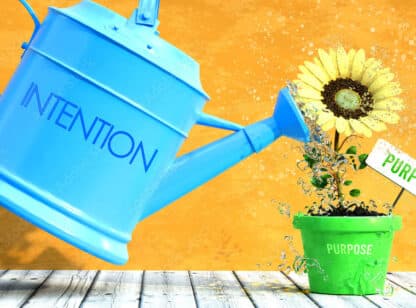The best part of being a couple? Wait for it…
It’s the authentic relationship you have with yourself.
‘To thine own self be true’ and ‘Know thyself’ are but a few quotes that depict the importance of self-actualization. With greater awareness, the terms selfish and self-serving can evolve into a greater sense of self-worth and self-esteem. The more self-aware you become, the more capable you are of entering into and sustaining a healthy relationship.
I like to use this visual. Think of two vessels half-full (or, half-empty if an Eeyore is reading this article, but this is a topic for another time). Many times, when two people meet, they fit like a dysfunctional lock and key. Why? They subconsciously believe this person will fill the rest of their empty vessel. This mindset can burden the relationship and create emotional distancing. On the other hand, if two people enter a relationship with their own vessel almost full (we’re perfectly imperfect, right?) they have the opportunity to complement one another and voila, the relationship lacks struggle.
Here are a few tips to help become the better part of a couple:
Reactivity and Impulsivity. Begin to observe how you react with another person. Are you an active listener or do you let your impulses run you? Take a breath to decide if this is the moment to respond. This may not be the hill you want to die on. Even when angry, a simple, but sometimes very difficult, “Thanks for sharing and I’ll think about what you said” can go a long way. And remember, screaming, raging rants can leave irreparable emotional scars. Building self-worth comes from working on self-regulation.
Your Past: When you are communicating, are you in your ‘adult child’ or your authentic ‘adult self’? Your early role models can greatly impact your current functioning and relationship. If two ‘adult children’ are disagreeing, healthy resolution can feel like an impossible feat.
Great Expectations: Have you ever explored all the unconscious expectations you’ve placed on your significant other? Maybe it’s time to address the fantasy and write a much healthier and realistic narrative – a novel idea.
Setting Healthy Boundaries: Respectfully shared, setting healthy boundaries can teach others how you want to be treated and increase a positive sense of self.
Giver or Taker? My rabbi once shared that finding ‘the one’ can be illusory and disappointing. He said that true love is tangibly expressed by performing random and very conscious acts of kindness for one another on a daily basis. Authentic love can then grow over time. Giving and taking has a reciprocal rhythm to it. Reciprocity is the true definition of a healthy and satisfying relationship.
Carl Rogers, a prominent psychologist, coined the term, ‘unconditional positive regard.’ When we prize another as we prize ourselves, unconditional love is possible, and I’ll respectfully add, don’t forget to prize yourself.
Amy Austin is a licensed marriage and family therapist (MFC# 41252) and doctor of clinical psychology in Rancho Mirage. Dr. Amy can be reached at (760) 774.0047.













































Comments (0)